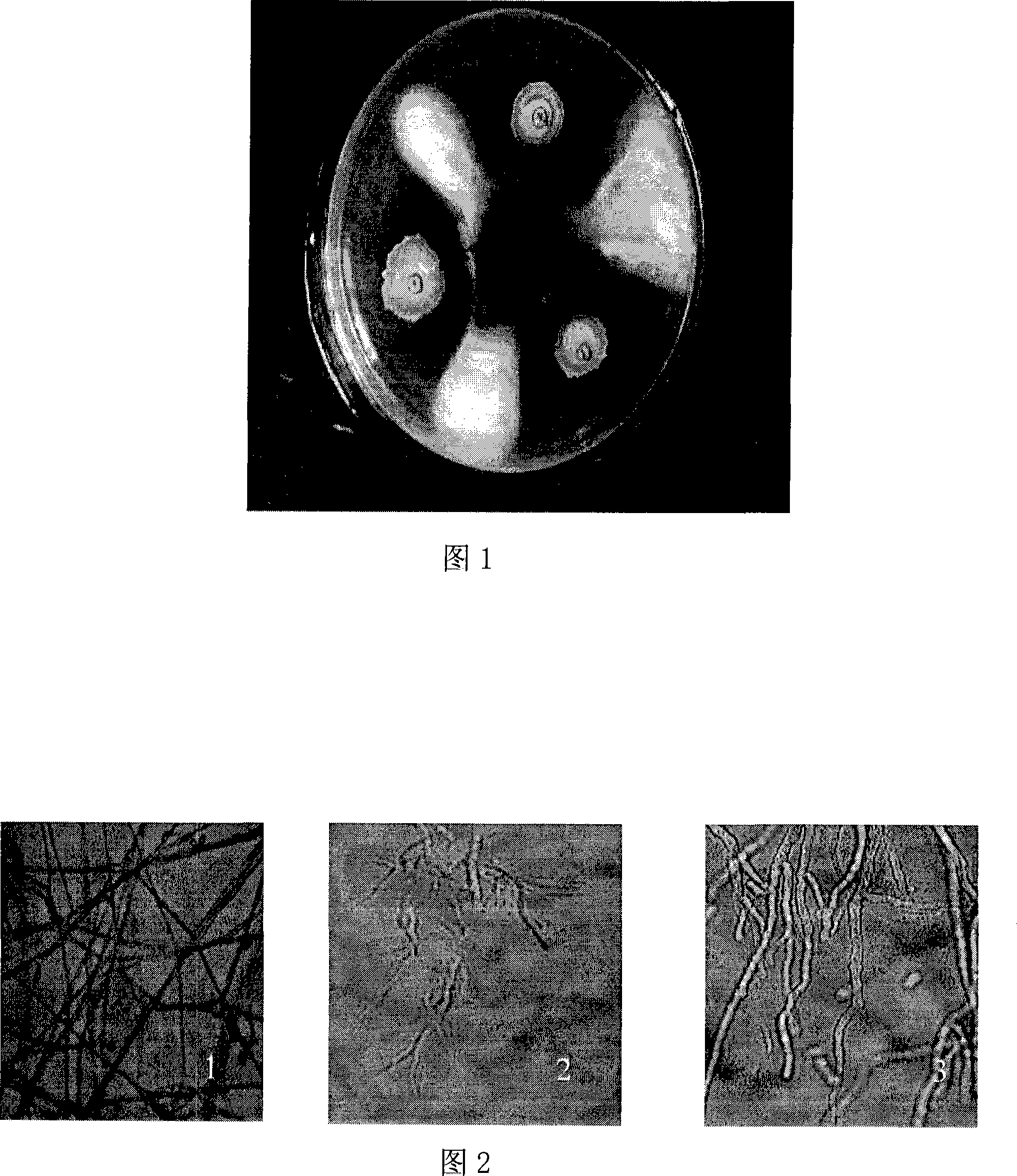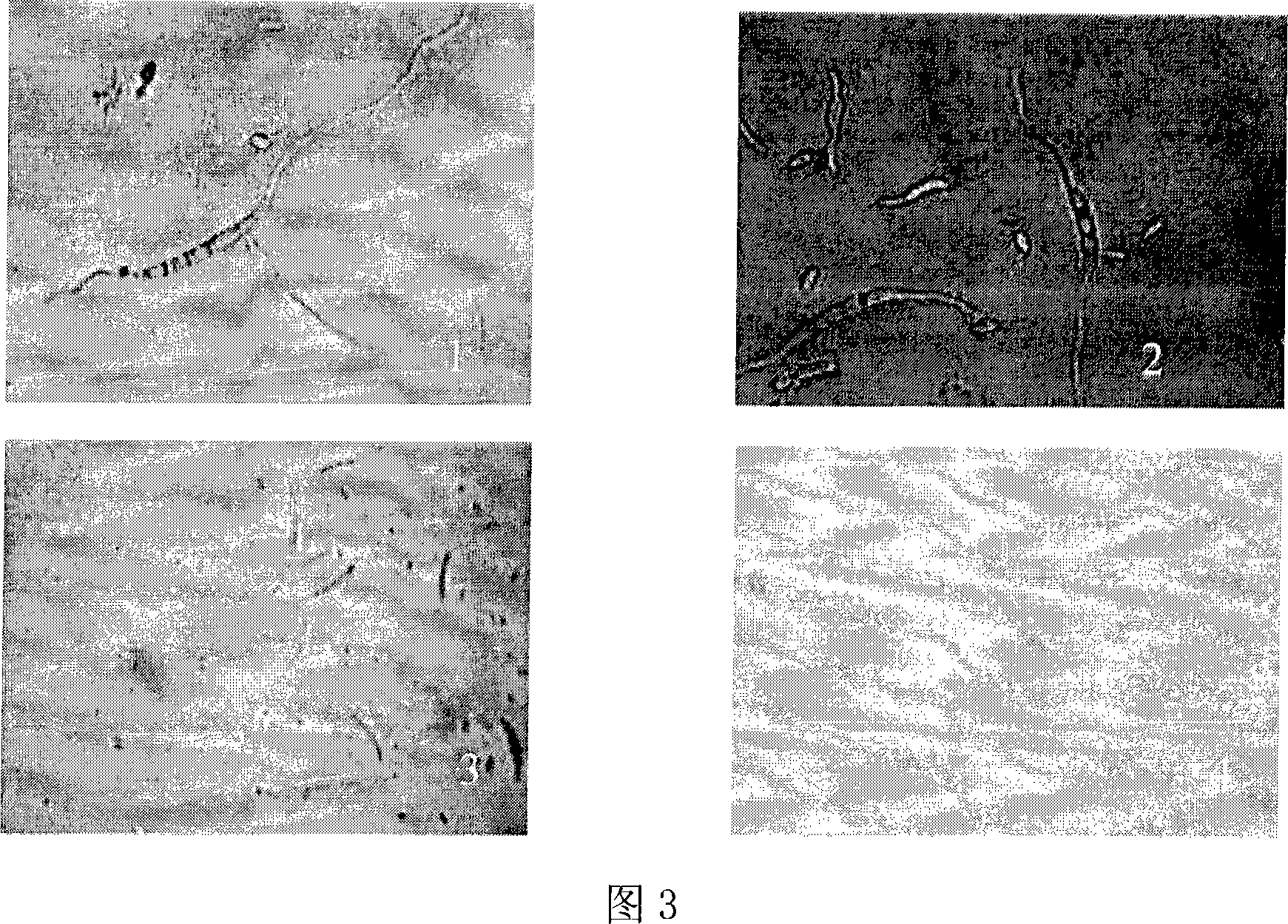Bacillus licheniformis 201 for highly effective preventing and curing banana wilt and application thereof
A technology of Bacillus licheniformis and banana wilt bacteria, applied in the direction of application, bacteria, fungicides, etc., can solve the problems of blank and weak technology, and achieve the effects of easy storage, good development and application prospects, and simple cultivation conditions
- Summary
- Abstract
- Description
- Claims
- Application Information
AI Technical Summary
Problems solved by technology
Method used
Image
Examples
Embodiment 1
[0020] Example 1 Inhibitory effect of Bacillus licheniformis 201 on mycelia FOC4 of Fusarium wilt fungus No. 4 race
[0021] Insert the 5mm diameter mycelium block of mycelium FOC4 of the banana fusarium wilt fungus race 4 into the center of the PDA plate of potato sucrose medium, and inoculate three pieces of sterilized filter paper with a diameter of 5mm around the FOC4 mycelium block at equal distances. 10 μL of culture solution of strain 201 cultured for 24 h was added dropwise on the filter paper sheet. Repeat three times, culture at 25-28°C, and measure the diameter of the inhibition zone after 5 days. It can be seen from accompanying drawing 1 that bacillus licheniformis 201 has a strong bacteriostatic effect on banana wilt.
Embodiment 2
[0022] Example 2 Inhibition of Bacillus licheniformis 201 on Banana Fusarium Wilt under Greenhouse Conditions
[0023] The Brazilian banana seedlings with a plant height of about 10 cm were immersed in the culture solution of the strain 201, and the OD of the culture solution was equal to 0.5. After 30 minutes, they were taken out and planted in flower pots. On the 2d, 7d, 15d and 30d respectively, pick up the banana seedlings, immerse them in the spore suspension of FOC4 for 30min, the spore suspension is 1×105 spores / mL, and then plant them in flower pots. Treat 36 plants in pots. After inoculation, the banana seedlings were placed in a greenhouse at 23-25°C for cultivation, and water was poured once per eye. The incidence rate and disease index were investigated 20 days, 30 days and 40 days after FOC4 inoculation. The results showed that the challenge inoculation with FOC4 after strain 201 was inoculated 15 days and 30 days later, compared with the control, the incidence ...
Embodiment 3
[0024] Example 3 Teratogenic effect of Bacillus licheniformis 201 on FOC4 hyphae
[0025] Cut the cellophane into strips of 5mm×25mm, autoclave at 121°C, and place it between the strain 201 and the pathogen FOC4 with tweezers. Cultivate at a constant temperature of 28°C for 5 to 7 days. After an obvious bacteriostatic zone appears between the mycelium of strain 201 and FOC4, carefully remove the cellophane and observe the morphological changes of the mycelium under a microscope with a power of 10×40. The pathogenic bacteria of strain 201 was used as a control. It was observed that the hyphae were enlarged and prominent in the early stage, and obviously thinned in the later stage, with many and short branches and uneven shape, see Figure 2, in which 1: normal growth of FOC4 hyphae (10×40 times); 2: hyphae swelling in the early stage Prominent (10×40 times); 3: Most of the hyphae become tapered in the later stage, with many and short branches, and uneven shape (10×40 times).
PUM
 Login to View More
Login to View More Abstract
Description
Claims
Application Information
 Login to View More
Login to View More - R&D
- Intellectual Property
- Life Sciences
- Materials
- Tech Scout
- Unparalleled Data Quality
- Higher Quality Content
- 60% Fewer Hallucinations
Browse by: Latest US Patents, China's latest patents, Technical Efficacy Thesaurus, Application Domain, Technology Topic, Popular Technical Reports.
© 2025 PatSnap. All rights reserved.Legal|Privacy policy|Modern Slavery Act Transparency Statement|Sitemap|About US| Contact US: help@patsnap.com


